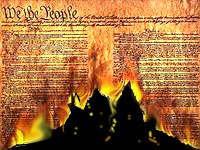
Through its late June judgment in the case of Hamdan v. Rumsfeld, the Supreme Court dealt a serious setback to the Bush Administration's contention that it could deal with prisoners suspected of terrorist activity largely unencumbered by the rule of law. The rejection of the government’s position culminated in the release of the plaintiff in the case, Abdel-Jabbar Hamdan, and a new effort by the White House to regain the ground it believes it has lost. This retrenchment is taking the form of draft legislation that President Bush is developing to send to Congress.
Given the rebuke dealt the Bush White House by the Court with regard to policies surrounding individuals captured in Iraq, Afghanistan and elsewhere, it might be expected that new legislation would seek to incorporate the implications of the opinion in Hamdan v. Rumsfeld. That expectation, however, would be wrong.
The Washington Post today published a story about the contents of the new draft bill, and, in summary, it would do the following:
- Legalize the type of military tribunal declared illegal by the court and give it jurisdiction over 25 types of crime, centered around direct involvement in terrorism
- Grant the Secretary of Defense discretion to add additional crimes to the jurisdiction of the new military court at will
- Deny defendants the right to confront accusers
- Refuse any guarantee of a public or speedy trial
- Reject the right of the accused to choose his or her own military counsel. Said counsel would also not be assured equal access to evidence held by prosecutors.
- Permit hearsay evidence
- Allow evidence obtained through physical coercion
- Deny prisoners any promise that they would even be present at their own trials, if that is deemed crucial to protecting national security
Judging from this, the only conclusion that can be drawn is that Attorney General Alberto Gonzales is employing Franz Kafka to craft legal policy. If by some stretch of the imagination one fails to see this as a violation of basic human rights because it is designed to apply only to “terrorists,” in timely fashion, José Padilla is once again in the news to remind us that U.S. citizens are not to be spared the vagaries of Bush Administration interpretations of the Constitution.
Padilla, it may be remembered, was arrested with great fanfare in Chicago on May 8, 2002, because the government alleged that he was part of a plot to detonate a “dirty bomb” in the United States. A U.S. citizen, he was still designated an “enemy combatant” by President Bush, imprisoned in a military jail, and denied access to counsel for over two years. The “enemy combatant” designation has recently been dropped, because the government has been unable to produce evidence to support it, and was facing an imminent Supreme Court challenge to his continued detention in a Navy brig. Padilla is now charged with being part of a domestic “support cell” for Islamist terrorism, and will be tried next year.
Putting all of this together, we have a president that has a track record of declaring citizens of this country – such as José Padilla - enemies of the state, and imprisoning them without the rights guaranteed them by the Constitution. Further, determined to skirt the refusal of the Supreme Court to buy into the structure of the tribunals he has pursued, Mr. Bush is now attempting to expand his reach to void additional constitutional and legal guarantees. Finally, this expansion of power, while ostensibly limited to foreign terrorists, is clearly set up to permit easy application to American citizens (see the second bullet above, in particular), and the record of this Congress in exercising oversight is at, or near, a historical low.
As John D. Hutson, U.S. Navy Judge Advocate General from 1997 to 2000, put it, this legislation, if passed, would permit the government to tell a prisoner: "We know you're guilty. We can't tell you why, but there's a guy, we can't tell you who, who told us something. We can't tell you what, but you're guilty." Maybe we should just relax because the terrorists who supposedly “hate our freedom” will have significantly less of them to worry about.
Feel safer yet?
No comments:
Post a Comment